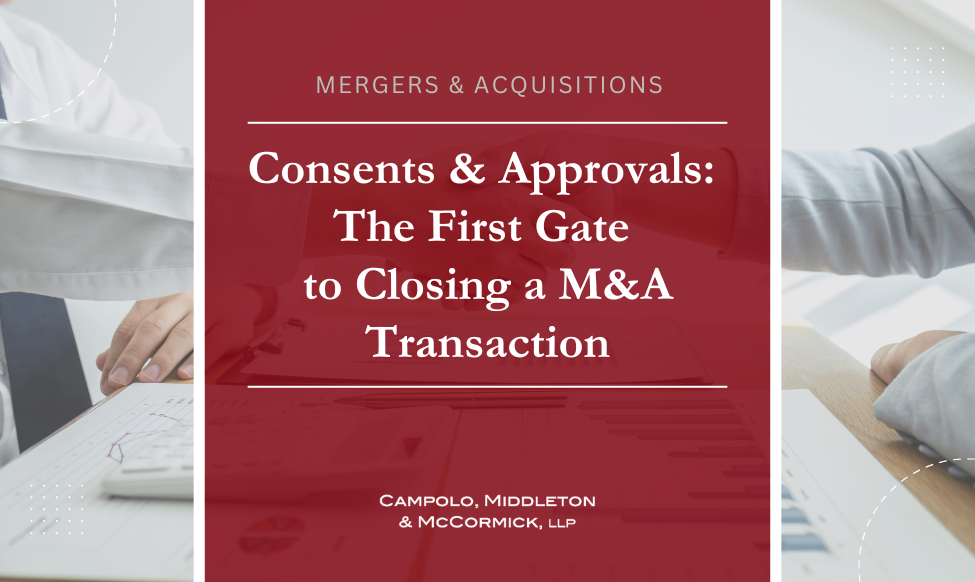One of the earliest and most critical legal obstacles in any mergers and acquisitions (M&A) transaction is securing the necessary consents and approvals. These consents can come from a range of parties including lenders, landlords, counterparties to key contracts, shareholders, franchisors, and regulatory agencies. Failing to obtain even one required approval can delay or derail a deal entirely, expose the parties to contractual liability, or lead to regulatory sanctions.
Bank loan consents are among the most commonly overlooked but vital approvals. Many corporate loan agreements include “change of control” clauses that trigger an event of default if the borrower undergoes a significant ownership shift. Without express consent from the lender, this could result in the acceleration of outstanding debt or other penalties. Early and transparent communication with lenders is therefore essential to avoid surprises late in the process.
CMM Partner Vincent Costa and Associate Alex Tomaro recently closed an M&A transaction involving the sale and transfer of multiple family-owned businesses and real estate assets across Long Island. The deal required the team to navigate particularly complex bank consents in order to close. Discussions with multiple lenders spanned several months and significantly delayed the closing, highlighting the importance of initiating lender conversations as early as possible in the deal timeline.
Landlord approvals are similarly important in asset deals or transactions involving corporate reorganizations. Commercial leases frequently contain provisions prohibiting assignment or subletting without the landlord’s prior written consent. Ignoring these clauses may result in lease termination or default, potentially disrupting business operations or diminishing the value of the deal.
Customer and supplier contracts often present a hidden risk. Key commercial relationships may be governed by contracts containing anti-assignment or change-of-control provisions. These clauses can allow counterparties to terminate or renegotiate agreements upon notice of the transaction, placing revenue streams and supply chains in jeopardy. Identifying these contracts early in diligence is essential to maintain operational continuity.
Shareholder and board approvals also play a central role, particularly in public or closely held companies. Internal corporate governance documents, such as bylaws and shareholder agreements, may require board approval or a supermajority shareholder vote to approve a sale. In some jurisdictions, statutory requirements impose additional procedural hurdles, including disclosures and fiduciary obligations that must be met before a transaction can close.
Franchise consents are critical in deals involving franchise businesses. Franchise agreements almost always include strict limitations on the transfer of ownership interests, requiring the franchisor’s prior written approval. Failing to obtain this consent can result in termination of the franchise rights, potentially rendering a core part of the business model inoperable. In sum, obtaining consents and approvals is not just a procedural step, it is often the first and most important gate to closing. Deal teams must map out a consent matrix early in the transaction timeline, proactively engage with stakeholders, and negotiate any required waivers or consents well in advance of closing to avoid costly delays or surprises.
Obtaining consents and approvals is not just a procedural step, it is often the first and most important gate to closing. Deal teams must map out a consent matrix early in the transaction timeline, proactively engage with stakeholders, and negotiate any required waivers or consents well in advance of closing to avoid costly delays or surprises.
M&A Deals: Here’s What You Need to Know
How Commercial Contracts Can Make or Break Your M&A Deal
What Really Keeps M&A Deals on Track? A Closer Look at Governance and Fiduciary Duties
The Overlooked Obstacle in M&A: Existing Debt and Its Hidden Risks
Employment and Compensation Issues in M&A Transactions
For guidance, contact Vincent Costa at vcosta@cmmllp.com or 631-738-9100.

